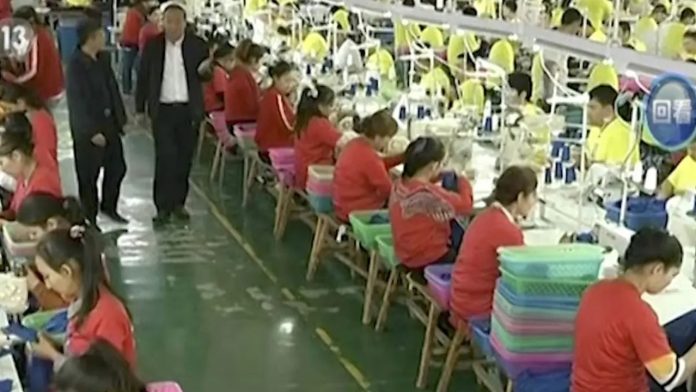In a shocking investigation conducted by Radio Free Asia (RFA), distressing details have emerged about a Chinese-run garment factory in Xinjiang, where approximately 90 Uyghur teenage girls are allegedly being subjected to forced labor, verbal and physical abuse. The factory, known as Wanhe Garment Co. Ltd. in Maralbeshi county, reportedly maintains a secret agreement with a nearby vocational school, forcing female students aged 16 to 18 to work against their will.
Sources, including a village chief and the factory’s security chief, who spoke on the condition of anonymity, shed light on the grim conditions endured by the workers. These young girls are forced to work arduous 14-hour shifts seven days a week, with little respite and are routinely mistreated. To add to the cruelty, local authorities have allegedly coerced parents into not objecting to sending their children to work at the factory.
The factory is managed by a Chinese husband-and-wife team who oversee a middle-aged Uyghur woman named Tursungul Memtimin, referred to as “teacher” by the workers. Memtimin is accused of wielding a bat to inflict harm on the workers and subjecting them to verbal abuse. Fear of retaliation has created an atmosphere where escape attempts are rare.
This grim revelation surfaces amidst growing evidence of Uyghur forced labor in Xinjiang, raising concerns about major companies’ supply chains. Companies like Inditex, the parent company of Zara clothing chain, Fast Retailing (parent company of Uniqlo), and car manufacturers Volkswagen, Mercedes-Benz, and BMW have come under increased scrutiny to ensure they are not using products manufactured with Uyghur forced labor.
The Uyghur Forced Labor Prevention Act in the United States, enacted in December 2021, mandates American companies importing goods from Xinjiang to prove that they are not involved in Uyghur forced labor at any stage of production.
Despite repeated attempts to seek an interview with Wanhe factory officials, RFA’s requests have been met with silence.
In the past, some workers managed to escape the factory compound, but their freedom was short-lived. The factory’s management reportedly went to great lengths to forcibly return them, threatening their parents with “re-education” camps if they failed to comply.
The factory, located in Kashgar province, employs workers from Maralbeshi, offering meager salaries of around 300 to 400 yuan (US$42 to US$56) per month for their long hours of labor. The region’s cotton industry has attracted investment, leading to the establishment of numerous textile and garment enterprises that benefit from cheap labor.
The situation at the Wanhe factory raises serious concerns about human rights abuses and highlights the urgent need for international companies to scrutinize their supply chains to ensure they are free from forced labor and exploitation.

